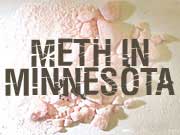Meth addicts try to educate students
June 14, 2004
 |
| Bree and Roger Hahn, both recovering meth addicts, share their stories with high school kids regularly in hopes of discouraging them from using meth. (MPR Photo/Dan Gunderson) |
Fergus Falls, Minn. — For most schools, the meth prevention program involves an anti-drug speech from the local police or sheriff. But many teens say they don't pay much attention to warnings from law enforcement.
A Fergus Falls-based organization is trying to get the attention of students by bringing meth addicts and their personal stories into schools and communities.
The Western Area City-County Cooperative is a group of 25 cities and 10 counties in west central Minnesota who share resources to save money.
A few months ago, law enforcement agencies began asking Executive Director Laurie Mullen to develop a meth training course for officers. As Mullen began researching the issue, she saw a need for meth education for the general public, and especially in schools.
 | |||
Mullen convinced a small group of recovering meth addicts who are willing to share personal stories to help with the training program. They've shared their experiences at public meetings in Fergus Falls, and in several schools around west central Minnesota. The presentation also includes a video on the dangers of meth.
Roger and Bree Hahn are two of those volunteers. The Fergus Falls couple met as teenagers. They ran away to Denver, Colorado. At 17, they became parents of twin daughters. They moved back to Fergus Falls heavily addicted to meth.
Roger and Bree say they lived to use meth. They left their children with Bree's parents for two years. Roger says he committed several robberies to support their meth use. He sold meth at Fergus Falls High School.
Eventually, Roger was arrested for drug possession. Then he was charged with drunk driving and ended up in a treatment program.
Roger and Bree say they've been drug-free for a year. They have their daughters back. Roger has a steady job and Bree is in a job training program.
But there are long-term effects of meth use. Both suffer short-term memory loss. Roger has a persistent bleeding ulcer, and continues to battle occasional paranoia and hallucinations.
"Meth wrecked my life," Roger Hahn tells students, "and it will wreck yours, too, if you try it even once."
|
We've had some challenges getting in to the schools ... I don't think any of them address meth and the severe addiction that's occurring. The general public has no idea. They're not informed enough to even be scared, and they should be.
- Laurie Mullen |
Roger and Bree say their focus is no longer on a drug, but on making a life for their twin girls, who are now 4 years old. Both say they feel compelled to do what they can to prevent kids from living through the same hell they experienced. That's why they're willing to bare their souls in front of large crowds of students.
But not all schools are interested in the meth education program.
"We've had some challenges getting in to the schools to do these presentations," says program organizer Laurie Mullen. "They've got prom day and DARE programs, they've got a lot of other programs that are important. But I don't think any of them address meth and the severe addiction that's occurring. The general public has no idea. They're not informed enough to even be scared, and they should be."
Some school administrators are in denial, according to Mullen.
"They've really closed their eyes to it. It's there. Students say meth is easier to obtain then marijuana or alcohol. I think when they began to open their eyes they will see it's much more readily available than they thought. And the percentage of young adults using is much higher than they ever thought," says Mullen.
One of the schools where Laurie Mullen brought her meth education program is Minnewaska area schools, a half hour south of Alexandria.
High School Principal Lyle Katzenmeyer has no illusions about the availability of meth in the area. He says if kids want it, they can get it -- even in the elementary grades.
Ketzenmeyer says an elementary student brought a "pretty rock" to school one day last winter. It was white and shiny. Later the teacher realized it was likely methamphetamine. The student had found it at home and unwittingly brought it to share with the class.
Katzenmeyer is not aware of any meth being used or sold in school, but he's not so naïve as to think it's not happening.
"We're beyond the denial stage. We're full-blown eyes open," says Katzenmeyer. "We know there's meth around, we know students have access to it. It's a much cheaper drug (than other drugs), and therefore very attractive to them. We believe if you want it, you can find it. Our purpose here is to make sure the kids' eyes are wide open to the effects of methamphetamine."
Katzenmeyer thinks having drug addicts tell their stories is a good way to get students' attention.
Like many Minnesota schools, Minnewaska faces budget cuts. Principal Katzenmeyer says he was forced to cut some drug and alcohol prevention activities this year, because there's no extra money. "When you're in a major reduction mode your priorities have to go to the classroom first, and you do what you can with the rest," says Katzenmeyer.
|
News Headlines
|
Related Subjects
|

